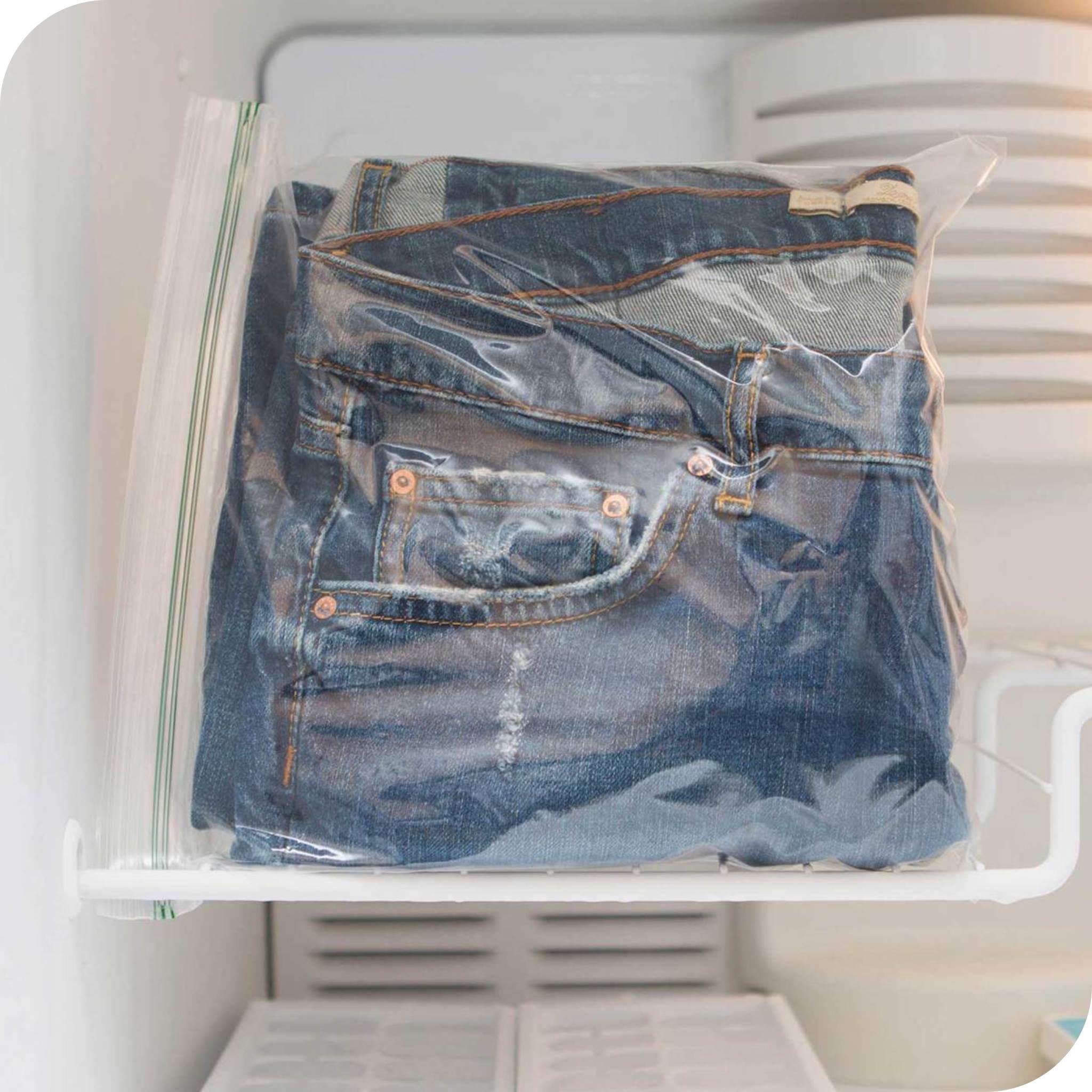1
HOME > Tips & Advice >
THE PROS AND CONS OF FREEZING YOUR JEANS
Written by Ivan Yaskey in Tips & Advice on the 17th May 2023

Do you wash your jeans – or just let them air out before slipping them on again? As we explore practices around taking care of clothing, from getting the most wear out of an item to reducing resources used, the conversation routinely veers toward denim. Do you wash it at all – and if so, how frequently? Should you use heat, and if so, how much, so that the material doesn’t fade prematurely? And, as an ongoing debate, should you be freezing your jeans? Proponents often set aside an area of their freezer to store folded jeans for this reason. Yet, scientific evidence shows that freezing doesn’t go beyond aesthetics:
Why Freezing Your Jeans is a Thing
The thought process behind freezing your jeans is, the cold, below-freezing temperatures kill bacteria from your body that are attracted to your skin cells and oils. This method supposedly makes them wearable multiple times over without a run through the machine and dryer. As a benefit, freezing supposedly preserves the denim – limiting fading from dark washes and raw, often expensive Japanese materials the wearer wants to maintain. It also creates a stiff feeling that better holds its shape and, for a more retro look, lends itself to creasing. Freezing your jeans shot to mainstream popularity back in 2014, when Levi Strauss & Co.’s CEO Chip Bergh described the practice and its benefits like water conservation in a piece for Mashable. Bergh’s process additionally includes scrubbing down the material with a sponge or toothbrush to remove particles, dirt, and bodily fluids. Denim purists predictably ran with the advice, but others questioned this method – and Bergh’s other tips, like only washing your jeans every month.

The Pros of Freezing Your Jeans
We’ve pretty much stated it all already: The bacteria-killing effect is total bunk (which we’ll explain shortly). Your jeans are also more likely to get clean without wasted water by a brief heating in a microwave. Style, really, is the only pro of freezing your jeans. If you’re seeking to capture that early- to mid-20th century character when denim transitioned from a Navy to civilian staple, look no further. For 100% cotton varieties, freezing gives that just-starched stiffness that a toss in the dryer just doesn’t achieve. It also helps prevent that loose, stretched out sensation that results from multiple wears between washes: In turn, your jeans feel just like new every time you put them on. Understand, however, that freezing doesn’t work for all types of denim. It’s kind of useless for stretch and blended materials, as well as well as anything pre-faded or distressed. Instead, raw and other unsanforized materials deliver the feel you’re seeking once frozen. At the same time, if you’re freezing your denim, you’re also likely not washing it regularly. Not washing by itself ends up consuming less water, helps slow the material fade, and reduces fabric breakdown. Should you want to genuinely control bacteria, the quick, high heat from the microwave often does the trick. Freezing, within this scope, is more of a physical feel and old-school vibe.
Why You Shouldn’t Be Freezing Your Jeans
You know what happens after you’ve worn your jeans (or any other item of clothing, for that matter) more than a few times between washes. You notice a distinct odor that’s a combination of sweat, bodily fluids, and whatever you accidentally spilled on yourself, plus any bacteria now forming colonies on the fabric. Researchers looked into the truth behind freezing your jeans and ultimately found a bunch of falsehoods. One, cold temperatures don’t entirely kill bacteria: Instead, they freeze, grow dormant, and resume their activity once you defrost your jeans. Two, the stench still remains: Yes, your jeans might feel stiffer, but they still smell like body odor. Third, once you wear your jeans after freezing them, more sweat gets into the fibers, contributing to bacterial growth. For an alternative, heat your jeans in the microwave at 121 degrees Celsius for a minimum of 10 minutes to better kill the bacteria present. Then, there’s the issue of wear. No, your jeans might not fade as much, but that’s solely because you’re not washing them. Freezing itself does very little to hold onto the dye and, instead, is purely ideal for a wrinkle-free, single-crease appearance.

Alternatives to Freezing Your Denim
So, if freezing your jeans does very little beyond aesthetics, what options do you have? If you’re going to follow the logic of washing your jeans every six weeks to four months:
- Use natural light: Hanging your denim outdoors or by a window better controls bacteria and odors and involves less electricity than using a microwave.
- Use a spray: Similar to homemade cleaning products, some create a vinegar solution that gets sprayed over the denim’s surface to control odors. Or, spray them with an odor neutralizer.
- Brush your jeans down: You do this for your suits, so why not your denim? Take a brush and go over the inside and outside of each pair to loosen and remove dead skin cells to avoid attracting bacteria and odors.
- Know how to properly wash your denim: Avoid hot water and the dryer: Especially for blended fabrics, the heat accelerates wear by breaking down the synthetic fibers and causing them to go slack or stretch out. For raw denim, consider hand-washing in cold water with an anti-fade detergent, and then line dry. Realize that the microbiome on your denim doesn’t change no matter how frequently you wash; rather, less-frequent washing simply leads to a more pungent and distinctive odor.
- Control stains: Realize that while you don’t have to wash your jeans regularly, stain treatment should be imperative to keep up their appearance. Immediately treat them with water and vinegar, soap, or degreaser, based on the substance absorbed into the material.
- Know how to store them: Fold your jeans to preserve their shape and limit wrinkles. Should you spot creases or a rumpled texture, go over the surface with a steamer.

Trending
2
3
4
5
6
7
8
9
10










